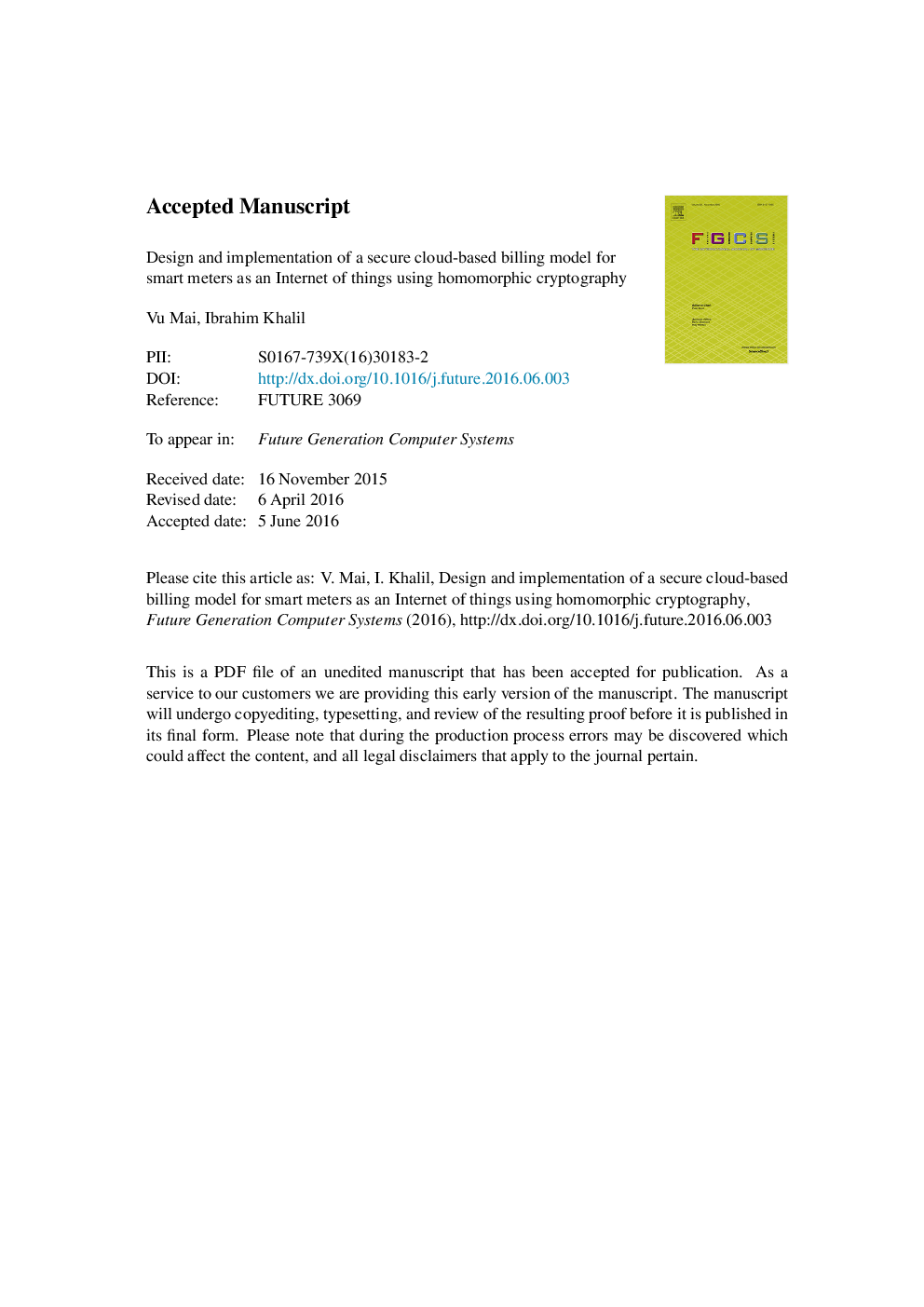| کد مقاله | کد نشریه | سال انتشار | مقاله انگلیسی | نسخه تمام متن |
|---|---|---|---|---|
| 4950251 | 1440642 | 2017 | 30 صفحه PDF | دانلود رایگان |
عنوان انگلیسی مقاله ISI
Design and implementation of a secure cloud-based billing model for smart meters as an Internet of things using homomorphic cryptography
ترجمه فارسی عنوان
طراحی و پیاده سازی مدل صدور صورتحساب مبتنی بر ابر برای دستگاه های هوشمند به عنوان اینترنت از چیزهایی که از رمزنگاری هماهنگ استفاده می کنند
دانلود مقاله + سفارش ترجمه
دانلود مقاله ISI انگلیسی
رایگان برای ایرانیان
کلمات کلیدی
ترجمه چکیده
شبکه های هوشمند بسیاری از مسائل مهم امنیتی و حفظ حریم خصوصی را به ویژه هنگامی که دستگاه های هوشمند به شبکه های عمومی متصل می شوند، ایجاد می کنند. اینترنت از چیزهایی است که اطلاعات مصرف مشتری اغلب مبادله می شود و حجم زیادی از آنها پردازش می شود. در این تحقیق، ما یک مدل ذخیره سازی و پردازش داده مبتنی بر ابر را با توانایی حفظ حریم شخصی کاربران و محرمانه بودن داده های هوشمند در یک شبکه هوشمند پیشنهاد می کنیم. این هدف با رمزنگاری داده های هوشمند متر قبل از ذخیره سازی در ابر با استفاده از رمزنگاری کلید هم نامرغوب نامتقارن. با استفاده از ویژگی هومورفیک از تکنیک رمزنگاری، ما پیشنهاد می دهیم روش هایی برای اجازه دادن به اکثر محاسبات از محاسبه صورتحساب مشتری بر اساس مصرف برق کل به طور مستقیم بر روی داده های رمز شده توسط ابر انجام می شود. یکی از ویژگی های برجسته در مدل ما، تجمیع خواندن شمارنده های هوشمند رمزنگاری شده با استفاده از رأی گیری تعداد نقطه ثابت است. برای آزمایش امکان سنجی مدل ما، تعداد زیادی از آزمایشات انجام شده برای برآورد تعداد افزودنیهای همگن که توسط ابر و زمان محاسبه در دوره های مختلف صورتحساب انجام می شود، با استفاده از داده های پروژه هوشمند، که در آن خواندن شبکه های هوشمند به طور مداوم از سایر خانوارها در هر ثانیه در عرض دو ماه و دادههای مصرف برق هر دقیقه از 400 خانه ناشناس در یک روز جمع آوری شد. ما همچنین یک نسخه موازی الگوریتم صدور صورتحساب ما را برای استفاده از قابلیت پردازش پردازنده های چند هسته ای در سرورهای ابر ارائه می دهیم تا زمان محاسبه در مقایسه با استفاده از الگوریتم پیوسته ما کاهش یابد. تحقیقات ما و آزمایشات به وضوح نشان می دهد که چگونه خدمات ابر می تواند امنیت، حریم خصوصی و کارآیی اطلاعات حساس به حریم خصوصی اغلب مبادله و پردازش در اینترنت از چیزهایی است که در آن متر هوشمند به طور مستقیم با شبکه های عمومی ارتباط برقرار می کنند.
موضوعات مرتبط
مهندسی و علوم پایه
مهندسی کامپیوتر
نظریه محاسباتی و ریاضیات
چکیده انگلیسی
Smart grids introduce many outstanding security and privacy issues, especially when smart meters are connected to public networks, creating an Internet of things in which customer usage data is frequently exchanged and processed in large volumes. In this research, we propose a cloud-based data storage and processing model with the ability to preserve user privacy and confidentiality of smart meter data in a smart grid. This goal is achieved by encrypting smart meter data before storage on the cloud using a homomorphic asymmetric key cryptosystem. By applying the homomorphic feature of the cryptographic technique, we propose methods to allow most of the computing works of calculating customer invoices based on total electricity consumption to be done directly on encrypted data by the cloud. One of the outstanding features in our model is the aggregation of encrypted smart meter readings using fixed-point number arithmetic. To test the feasibility of our model, we conducted many experiments to estimate the number of homomorphic additions to be performed by the cloud and the computation time in different billing periods using data from the Smart project, in which smart grid readings were continuously collected from different households in every second within two months and electricity usage data collected every minute from 400 anonymous houses in one day. We also propose a parallel version of our billing algorithm to utilize the processing capability of multi-core processors in cloud servers so that computation time is reduced significantly compared to using our sequential algorithm. Our research works and experiments demonstrate clearly how cloud services can strengthen the security, privacy and efficiency of privacy-sensitive data frequently exchanged and processed in an Internet of things where smart meters communicate directly with public networks.
ناشر
Database: Elsevier - ScienceDirect (ساینس دایرکت)
Journal: Future Generation Computer Systems - Volume 72, July 2017, Pages 327-338
Journal: Future Generation Computer Systems - Volume 72, July 2017, Pages 327-338
نویسندگان
Vu Mai, Ibrahim Khalil,
